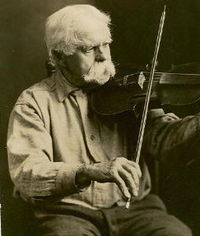Annotation:Haywood Schottische: Difference between revisions
No edit summary |
m (Text replacement - "garamond, serif" to "sans-serif") |
||
| (2 intermediate revisions by one other user not shown) | |||
| Line 1: | Line 1: | ||
'''Back to [[{{BASEPAGENAME}}]]''' | =='''Back to [[{{BASEPAGENAME}}]]'''== | ||
---- | ---- | ||
<p><font face=" | <p><font face="sans-serif" size="4"> | ||
'''HAYWOOD SCHOTTISCHE'''. American, Schottische (4/4 time). D Major. Standard tuning (fiddle). AA'BB'. Composed by elderly fiddler Mellie Dunham (1853-1931) of Norway, Maine. The elderly Dunham was Henry Ford's champion fiddler in the late 1920's, and received a great deal of press for a time through that association. Ford was interested in presenting old-time dancing and music as an alternative to the 'flapper' influences in American culture of the era. The schottische is named for the social club where Dunham played near his home. | '''HAYWOOD SCHOTTISCHE'''. American, Schottische (4/4 time). D Major. Standard tuning (fiddle). AA'BB'. Composed by elderly fiddler Mellie Dunham [http://en.wikipedia.org/wiki/Mellie_Dunham] (1853-1931) of Norway, Maine. The elderly Dunham was Henry Ford's champion fiddler in the late 1920's, and received a great deal of press for a time through that association. Ford was interested in presenting old-time dancing and music as an alternative to the 'flapper' influences in American culture of the era. The schottische is named for the social club where Dunham played near his home. | ||
[[File:dunham2.jpg|200px|thumb|left|Mellie Dunham]] | [[File:dunham2.jpg|200px|thumb|left|Mellie Dunham]] | ||
<br> | <br> | ||
<br> | <br> | ||
</font></p> | </font></p> | ||
<p><font face=" | <p><font face="sans-serif" size="4"> | ||
''Source for notated version'': | ''Source for notated version'': | ||
<br> | <br> | ||
<br> | <br> | ||
</font></p> | </font></p> | ||
<p><font face=" | <p><font face="sans-serif" size="4"> | ||
''Printed sources'': Dunham ('''Mellie Dunham's Fiddlin' Dance Tunes'''), 1926; No. 4, p. 4. | ''Printed sources'': Dunham ('''Mellie Dunham's Fiddlin' Dance Tunes'''), 1926; No. 4, p. 4. | ||
<br> | <br> | ||
<br> | <br> | ||
</font></p> | </font></p> | ||
<p><font face=" | <p><font face="sans-serif" size="4"> | ||
''Recorded sources'': <font color=teal>Rounder CD7018, Frank Ferrel - "Boston Fiddle: The Dudley Street Tradition."</font> | ''Recorded sources'': <font color=teal>Rounder CD7018, Frank Ferrel - "Boston Fiddle: The Dudley Street Tradition."</font> | ||
</font></p> | </font></p> | ||
| Line 23: | Line 23: | ||
<br> | <br> | ||
---- | ---- | ||
'''Back to [[{{BASEPAGENAME}}]]''' | =='''Back to [[{{BASEPAGENAME}}]]'''== | ||
Latest revision as of 13:23, 6 May 2019
Back to Haywood Schottische
HAYWOOD SCHOTTISCHE. American, Schottische (4/4 time). D Major. Standard tuning (fiddle). AA'BB'. Composed by elderly fiddler Mellie Dunham [1] (1853-1931) of Norway, Maine. The elderly Dunham was Henry Ford's champion fiddler in the late 1920's, and received a great deal of press for a time through that association. Ford was interested in presenting old-time dancing and music as an alternative to the 'flapper' influences in American culture of the era. The schottische is named for the social club where Dunham played near his home.

Source for notated version:
Printed sources: Dunham (Mellie Dunham's Fiddlin' Dance Tunes), 1926; No. 4, p. 4.
Recorded sources: Rounder CD7018, Frank Ferrel - "Boston Fiddle: The Dudley Street Tradition."
